They say… 
Best beer and travel writing award 2015, 2011 -- British Guild of Beer Writers Awards
Accredited Beer Sommelier
Writer of "Probably the best book about beer in London" - Londonist
"A necessity if you're a beer geek travelling to London town" - Beer Advocate
"A joy to read" - Roger Protz
"Very authoritative" - Tim Webb.
"One of the top beer writers in the UK" - Mark Dredge.
"A beer guru" - Popbitch.
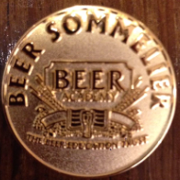
|
First published in BEER May 2008 as part of a piece about Norfolk milds. More Norfolk milds in previous post.
ABV: 4 per cent
Origin: Lingwood
Website www.littlebeershop.co.uk
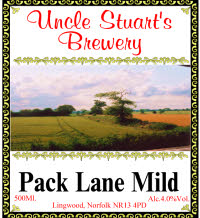 Uncle Stuart's Pack Lane Mild Uncle Stuart’s on the outskirts of Norwich is one of a small but growing number of small breweries that are finding an alternative route to market with a twist on vertical integration, using a bottled beer shop rather than a cask-driven pub as their retail outlet. In this case it’s the Little Beer Shop at Blofield, and they do mean little – it’s essentially a shed run as a franchise in a sprawling garden centre, but it’s packed from floor to ceiling not only with house brews but with a wide range of other hard-to-find East Anglian craft beers, almost all of them bottle conditioned.
The Uncle in question is Stuart Evans, who graduated from home to full-time brewer in 2002 on what was then one of the smallest commercial brewing plants in Britain, though it’s since expanded. The first beer brewed was Pack Lane Mild, named after the street where the business is located, and the rustic scene depicted on the label is actually the view from the brewery, which uses water from a nearby borehole as brewing liquor.
Made from Pearl pale, crystal, black and wheat malts, roasted barley and Goldings and Progress Hops, this mild pours a very dark brown with a generous fawn head as bubbly as the inside of an Aero. The chocolatey impression is complimented by the palate which also has a hint of roast and farmyard scents.
There’s Ovaltine and vivid tart fruit flavours in an interesting chocolatey palate with a herbal hop note, and a mouth-coating cocoa powder finish with a roast hit and a nugget of bitter hops. It’s a distinctive beer that’s on the roasty side for a mild, and well worth trying.
More Norfolk milds in next post.
Read more about this beer at ratebeer.com: http://www.ratebeer.com/beer/uncle-stuarts-pack-lane/35798/
First published in BEER May 2008 as part of a piece about Norfolk milds.
Beer sellers: Beers of Europe
ABV: 3.8 per cent
Origin: Acle
Website www.tipplesbrewery.com
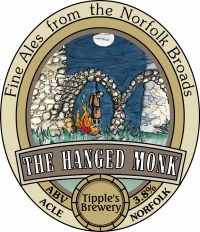 Tipples The Hanged Monk The English region most associated with mild is, of course, the West Midlands, still home to a good few classics in cask. But if you’re planning to celebrate the style indoors this Mild Month with a few decent real milds in a bottle, you’ll need to look further afield for a decent choice. The flat and marshy rural landscapes of England’s eastern counties may be very different from the urban sprawl of the Black Country, but innovative microbreweries are in plentiful supply, and thankfully most of them seem to consider a bottled dark mild an essential entry in a self-respecting craft brewer’s portfolio. This year all three beers featured below come from small-scale but very talented brewers in Norfolk.
Tipples Brewery, on the edge of the Broads, doesn’t take its name from a quaint term for an alcoholic drink but from its owner, the fortuitously named Jason Tipple, who opened it in 2004 after quitting the financial services industry. He’s since gained a high reputation for his well-crafted ales.
Jason is a self-confessed “big fan of milds” and when he sat down to devise a recipe he found himself inventing not just one mild but three. Trying to think of original names, he hit upon the theme of Broads ghost stories, eventually launching the beers as a trilogy just before Halloween 2005. The Hanged Monk, named for a traitorous monk said to haunt the ruins of St Benet’s Abbey on the river Bure, has since become a permanent addition to the bottled range, though the Monk’s spooky companions, Jack’s Revenge and Lady Evelyn, still haunt the brewery in draught form.
The Monk is brewed from pale, crystal and chocolate malts, and three hop varieties, emerging from the bottle near-black with a thick, pillowy head. A very spicy aroma has a sharp blackcurrant fruit note with roast, liquorice, cola and flowery hops.
A complex dark malted milk palate has a hint of fruit and a vivid dry mineral quality, with more cola and blackcurrant pastille and a smooth chewy texture – the upfront roast that’s often found in modern craft-brewed milds is absent here. Subtle roast notes do emerge from a dry but not bitter swallow, and the long finish also boasts refreshing fruit, restrained nettly hops and a late wet stone note.
No nebulous spirit, then, but a firm, satisfying, beautifully balanced and eminently drinkable beer that packs an abundance of flavour into a modest gravity – surely a hallmark of the classic mild.
More Norfolk milds in next post.
Read more about this beer at ratebeer.com: http://www.ratebeer.com/beer/tipples-the-hanged-monk/54976/
First published in BEER April 2008 as part of a piece on beer in Sainsbury’s. More Sainsbury’s beers in previous post.
ABV: 8 per cent
Origin: Buggenhout, East Flanders, Belgium
Website www.bestbelgianspecialbeers.be
 Bosteels Tripel Karmeliet Flemish independent Bosteels, still in the hands of the same family that founded it in 1791, is best known for Pauwel Kwak – or rather for that beer’s elaborate glass, which looks like a piece of lab equipment in a wooden bracket. Kwak itself is a drinkable enough beer with some character, but much better is this lesser known speciality from the same brewery, which comes with rather more sensible glassware.
It’s a bottle conditioned golden abbey beer with a difference, made with three grains – barley, wheat and oats in both malted and unmalted forms, plus Styrian Goldings hops and spices – and allegedly based on a 1679 recipe from the Carmelite monastery in nearby Dendermonde.
The beer pours with a thick white head and a scented coriander and rye bread aroma. A complex, dry cereal palate has a velvety note from the oats and unusual spirity flavours – perhaps genever gin or good vodka – with pear, vanilla and more coriander. Citrus notes lift the obvious alcoholic weight, with a long, bready and botanical spiced orange finish.
The beer is one of a number of interesting Belgian and German imports currently available at Sainsbury’s alongside domestic specialities from Meantime and others.
Read more about this beer at ratebeer.com: http://www.ratebeer.com/beer/tripel-karmeliet/5368/
First published in BEER April 2008 as part of a piece on beer in Sainsbury’s.
ABV: 4.7, 6.5 and 7.5 per cent
Origin: Charlton, London, England
Website www.meantimebrewing.com
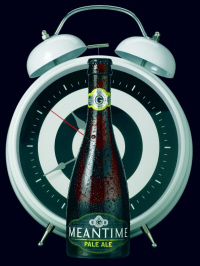 Meantime Pale Ale When Heriot-Watt and Weihenstephan-trained brewer Alastair Hook set up on his own in an industrial unit a stone’s throw from the Thames Barrier in 2000, he chose to follow what for a British microbrewer was a pretty much unprecedented business plan. Rather than touting cask ale around the free trade and festivals, Alastair initially set about using his Bavarian experience to brew quality lager – a beer style unfairly and excessively devalued by big UK brewers’ weak and insipid interpretations of international brands – in bottles or continental-style bright kegs.
Ales and wheat beers have since joined the portfolio, including a good number of bottle conditioned brews, but cask remains absent. It’s an approach that hasn’t always endeared him to real ale purists, but it’s certainly yielded some magnificent, near-world class beers as well as being a living demonstration that there is always another way.
Meantime, named for its location in the borough of Greenwich, originally focused on contract brewing and targeting those pioneering restaurateurs that were starting to recognise fine beer has its place on the menu alongside fine wine. The brewery started to establish its own identity through a partnership with supermarket chain Sainsbury’s. In 2002 the giant multiple retailer was busy establishing its Taste the Difference range of upmarket own-brand products, and worked with Meantime to create several European style beers for the range, including a rare example of a red Vienna lager.
The Sainsbury’s link, continuing interest from the restaurant trade and overtures from a US importer built the brewery’s confidence and it expanded, rebranded and relaunched in 2005, investing heavily in a new filling machine to ensure absolute hygiene, as well as the only corking machine at a British brewery capable of filling, corking and wiring 75cl champagne-style bottles.
This machine is particularly significant: if, as most informed commentators suggest, the key to establishing bottled beer’s gourmet credentials with a wider audience is through promoting it as an accompaniment to food, then there’s a need to present it in ways that won’t look out of place on the most sophisticated dining table.
And the beer that goes into those nice big bottles is well deserving of such VIP treatment. Currently two Meantime lines are presented this way, both of them Real Ales in a Bottle based on ancient British styles – a porter and an India Pale Ale. Both styles, interestingly, were somewhat neglected and forgotten in their native land but have enjoyed a new lease of life among US craft brewers and drinkers, so it’s not surprising Meantime’s pair were originally commissioned for export.
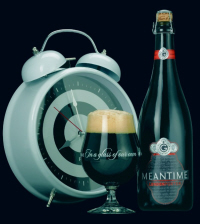 Meantime London Porter London Porter is based on a 1750 recipe and contains seven malts including brown, black and chocolate malts, alongside Fuggles hops. The result is a deep ruby-brown beer with a rich creamy fawn head that yields a spicy, leathery, coffeeish aroma with a hint of roast chestnut. A full bodied but refined palate has a creamy texture, chocolate hints and emerging sappy, roasty, peppery hop and lightly acidic flavours. A long finish has an intriguingly sour coffee character, with roast rather than hops giving an ashy dryness, and late salt and blackcurrant hints.
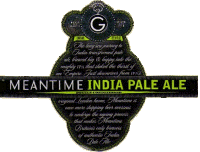 - Meantime India Pale Ale
Meantime’s IPA is arguably the most reliable of a precious handful of authentic British-brewed bottle conditioned interpretations of this historic style. Brewed from pure pale malt with Fuggles and Goldings hops, this strong but refreshing beer is a deep gold, almost copper, with a fine off-white head. A barley sugar aroma has gentle pineapple and earthy notes, leading to a firmly malty palate that unfolds in several layers: fruity and slightly brambly at first, then syrupy with a hint of aromatic peaches, with bitterish but not overpowering grapefruity hops finally emerging. There’s more peppery hops in a long finish over a pineapple cube and barley sugar backdrop.
The brewery also offers a range of intriguing beers in more modest gravities and sizes, most of them in distinctive skittle-shaped 33cl bottles, for example a beautifully fresh-tasting unfiltered Pale Ale dry hopped with Cascade and Willamette. This has a chaffy vanilla and pineapple aroma and a tasty cereal palate with a little fruit, pollen and grassy citric hops. Firm, earthy and peppery but well-controlled hops emerge in the drying, bitterish finish.
Quality and consistency are the watchwords: “We don’t skimp on maturation times,” says Alastair, “and we never pasteurise – why take care over making a beer only to cook it?” The results speak from themselves.
More Sainsbury’s beers in next post.
Read more about these beers at ratebeer.com:
http://www.ratebeer.com/beer/meantime-pale-ale/51741/
http://www.ratebeer.com/beer/meantime-london-porter/48499/
http://www.ratebeer.com/beer/meantime-india-pale-ale/48498/
First published in BEER March 2008 as part of a piece about Welsh beers. For more Welsh beers see previous post.
ABV: 4.2 per cent
Origin: Upper Cwmbran, Torfaen
Website www.cwmbranbrewery.co.uk
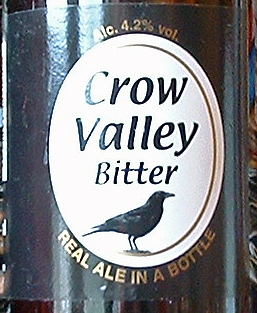 Cwmbran Crow Valley Bitter When Martin Lewis and Keith Gullick first created this cottage brewery fed from a mountain spring under the shadow of Mynydd Maen in 1996, they decided to concentrate on perfecting just one beer – the nicely balanced Crow Valley Bitter. Since then they’ve added a number of different cask beers as well as their only Real Ale in a Bottle, a version of their still-impressive flagship. It’s made from a traditional recipe of Maris Otter pale, crystal and dark crystal malts with Goldings, Fuggles and Northdown hops.
This rich amber beer starts with a relatively reserved lightly nutty aroma with hints of minerals, burnt toffee and hops. A lightly oily and juicy palate has more mineral salts, nuts, citrus and grassy hops, with a hint of raspberry on the swallow. Straw and hop flavours emerge over subtle fruit and faint boiled sweets in a chaffy finish with some late delicate leafy notes. Overall this is a subtle and characterful beer of very high quality, well repaying the time the brewers have spent on getting it right.
Read more about this beer at ratebeer.com: http://www.ratebeer.com/beer/cwmbran-crow-valley-bitter/31550/
First published in BEER March 2008 as part of a piece about Welsh beers. For more Welsh beers see previous post.
ABV: 3.9 and 5.5 per cent
Origin: Capel Dewi, Sir Gaerfyrddin
Website www.ffosyffinbrewery.co.uk
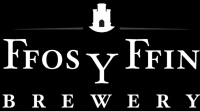 Bragdy Ffos y Ffin Dairy farmer Glyn Lenton took over Ffos y Ffin farm outside Capel Dewi in rural Carmathenshire in 1990. Some years later he and friend Steve Smith, both enthusiastic home brewers, discovered a spring on the farm was the perfect source of brewing liquor. They installed the brewery in 2005, designing and building the kit from scratch rather than buying an off-the-peg system. Their reputation for quality is spreading – a celebrity chef had been on the phone in search of samples just before I called.
Cothi Gold is named for a gold mine on a tributary of the brewery’s local river, the Towi. This is a tasty golden ale with a good bubbly head and a light mineral malt aroma with a yeasty banana-ish hint. A firm flavoursome and fresh palate has strawberry, vanilla and citric notes with light hops, while a cleansing swallow leads to a biscuity malt finish with deeper pepper hops and a very slightly soapy quality.
It’s a great example of refreshing session beer, brewed with floor malted Maris Otter pale barley malt from Warminster maltings, crystal malt, flaked maize and torrefied wheat, with Boadicea hops for bittering and Goldings, Progress and Zatec (Saaz) for aroma.
The name of the more robust Paxton’s Pride refers to a nearby folly built in 1812 by Sir William Paxton to celebrate Nelson’s victories. This reddish amber ale with its thick yellow head is actually brewed from the same grains as Cothi Gold, but in different proportions. The burst of hops on an intoxicating fennel and spiced orange aroma comes courtesy of Northdown, Fuggles, Styrian and a late addition of Zatec. The palate contrives to be both firmly malty and bone dry with incense and orange oil and a hint of smoke. The orange fruit turns pithy and marmaladey on a lingering and satisfying finish.
Four other real ales in a bottle are also well worth trying.
More Welsh beers in next post.
Read more about these beers at ratebeer.com:
http://www.ratebeer.com/beer/ffos-y-ffin-cothi-gold/79597/
http://www.ratebeer.com/beer/ffos-y-ffin-paxtons-pride/66118/
First published in BEER March 2008 as part of a piece about Welsh beers.
Beer sellers: Meadow Farm Shop
ABV: 4.8 and 8 per cent
Origin: Pontypridd, Rhondda Cynon Taf
Website www.otleybrewing.co.uk
 Otley O-Garden Last month’s BEER previewed CAMRA’s Members’ Weekend in Cardiff by featuring Welsh beer and breweries, with my colleague Brian Glover reporting Wales is “fermenting furiously again, with more than 35 breweries.” What Brian didn’t mention is that an impressive proportion of these breweries are now bottling their beer, including as Real Ale in a Bottle.
I’ve long made a point of featuring Welsh beers in the March issue as it appears just before St David’s Day, but I once used to struggle to find even one bottle conditioned example to feature. This year there are so many to choose from I’ve opted to feature South Wales only, and leave the north till next year.
There are now enough brewers bottling in Wales to sustain a dedicated Welsh beer shop – the Meadow Farm Shop opened last year at Tintern, Monmouthshire (tel 01291 680101, email meadowfarm1@aol.com, no mail order yet but it’s planned this year). This is part of Kingstone Brewery which also offers its own wide range of bottle conditioned beers.
With its stylish white-on-black labels and minimalist names featuring the letter O, the Otley brewery gives its beers the presentation they. The beers exist because in 2005 Nick Otley and his fellow owners of the small independent pub and restaurant company that runs the Otley Arms and two other outlets in Pontypridd decided it made sense to add a brewery.
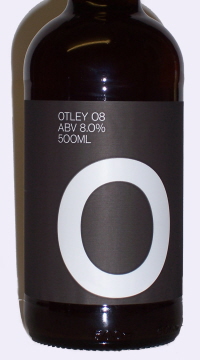 Otley O8 O-Garden is the brewery’s take on a wheat beer, with coriander and orange peel but curiously without the wheat! It pours a slightly cloudy golden with a creamy white head and an interesting hops and spiced orange aroma, with hints of hay and herbs. A dry palate integrates hops with orange and herb flavours and a slight apricot note. Coriander becomes more obvious in the finish which lingers with more spiced orange and a light hint of roast. Hopefully InBev haven’t contacted their lawyers yet!
The hefty O8 is an amber barley wine lent an aromatic edge with US Willamette hops. It starts with moist cake, citrus and orchard fruit and doughy pale malt on a complex floral-perfumed aroma. A firm, dry palate has sherbet fruit and mousse-textured malt with nectary orange notes and peppery hops. There’s more orange fruit in a peppery, slightly vegetal bitter finish w a hint of orange liqueur. “Dangerously drinkable” has become a cliché with strong beer but it’s well-deserved here– this strong but delightfully fresh and juicy beer slips down with perilous ease.
For more Welsh beers see next post.
Read more about these beers at ratebeer.com:
http://www.ratebeer.com/beer/otley-o-garden/76223/
http://www.ratebeer.com/beer/otley-o8/58323/
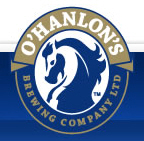 O'Hanlon's Brewing Company Ltd First published in BEER February 2008.
ABV: 5 per cent
Origin: Whimple, Devon
Website www.ohanlons.co.uk
[Note this beer may since have been discontinued.]
In the interests of variety and even-handedness I aim to avoid featuring the same brewer on this page more than once a year. Over the past few months I’ve made a rare and well-deserved exception for O’Hanlons, and having just tasted the own label Real Ale in a Bottle they’ve just started brewing for Tesco, I’m obliged to do so again, especially following recent discussion in What’s Brewing on Marks and Spencer’s new RAIB lines.
Own brands aren’t always the most characterful products but that’s not the case with this substantial but refreshing brew. The beer is mid-brown with a good off-white head and a notably spicy aroma with blackcurrant, toasty malt, liquorice and humbug notes. A dry, nutty palate fills the mouth with spicy hops and seedy, twiggy flavours without being overbitter. The finish dries out further with some smoky malt, developing peppery hops and a deliciously fruity undertow.
The fact that Tesco has moved so quickly in launching an own brand British bottle conditioned ale is a vote of confidence for Real Ale in a Bottle that would be good news even if the beer turned out to be only reasonably good. But I’d welcome a beer of such quality to the shelves of Britain’s biggest supermarket no matter what label it was under. What a cheering start to the year.
Read more about this beer at ratebeer.com: http://www.ratebeer.com/beer/tesco-finest-bottle-conditioned-ale/80290/
First published in BEER February 2008.
ABV: 3.9 per cent
Origin: Hebden Bridge, West Yorkshire
Website www.littlevalleybrewery.co.uk
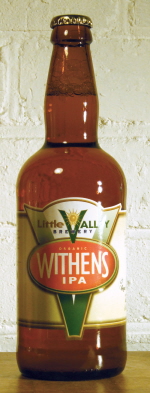 Little Valley Withens IPA As most readers will know, India Pale Ales were originally high gravity, generously hopped export products that later evolved into the more session-friendly draught interpretations still supplied by the likes of Caledonian and Greene King. It’s the original style that’s most caught the imagination of the many contemporary craft brewers who’ve recently added revivalist IPAs to their ranges – a trend that’s been taken to extremes on the West Coast of the USA.
So it’s good to see a small brewer demonstrating that pale ale can still be supremely tasty and satisfying at quaffable strength. Withens IPA is one of six Real Ales in a Bottle from 100% organic Little Valley Brewery, founded in 2005 in attractive Calderdale in the South Pennines by Dutch-born and Bavarian-trained master brewer Wim van der Spek and his English partner Sue Cooper.
The beer takes its name from nearby Withens Clough Reservoir, fed by water from the surrounding moors which supplies the brewing liquor. The all-organic ingredients list comprises pale malt, caramalt, wheat malt, First Gold and Cascade hops.
An appropriately golden colour with a lightly foamy white head, the beer yields a tangy aroma with pineapple fruit and resins. The dry light malt palate develops more complex orange and spice notes, and a not unpleasant farmyard hint. A tangy finish has tart fruit and a flash of roast, developing a late flower petal hint.
Wim set out to brew a hoppy but drinkable beer with a pleasantly light body – in this he’s succeeded admirably with friendly and flavoursome results. “Beer produced with love and passion,” runs the strapline on the label, and I don’t doubt that it’s true.
Read more about this beer at ratebeer.com: http://www.ratebeer.com/beer/little-valley-withens-ipa/52372/
First published in BEER February 2008.
ABV: 3.8 and 5.5 per cent
Origin: Allendale, Northumberland
Website www.allendalebrewco.co.uk
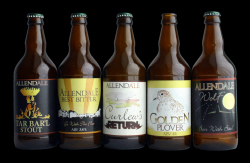 Allendale Brewery beers The small and remote riverside town of Allendale, just shy of Hadrian’s Wall, is home to one of England’s most youthful breweries. For brewer and co-founder Tom Hick it’s his first job since leaving college: he went from a zoology degree to a brewing masters at Sunderland then set up his own business with the help of his father Jim.
Last year they branched into small scale bottle conditioning for the local market, with such success that they’ve now had to supplement their own bottles by contract bottling two beers in filtered form at Hambleton Ales. Tom says the bottle conditioned versions sell best at farmers’ markets, while lager drinkers are more easily persuaded to try filtered beers.
Tom sent me both filtered and bottle conditioned incarnations of his standard session ale and local best seller, Best Bitter, affording the rare opportunity of a direct comparison. This is a pale amber ale with a traditional grist of Maris Otter pale and crystal malts, hopped with Goldings, Fuggles and English Target and pouring with a fine yellowish head.
The filtered version has a lightly malty, brambly aroma leading to a crisp, dry and quite sternly hoppy palate, with notes of boiled sweets and burnt toast. Bitterish, lettucey resins in the finish are balanced by slightly syrupy malt – a straightforward, pleasantly drinkable beer on the hoppier side of bitter.
The “real” version is clearly the same beer, but with extra freshness and complexity and no slightly cooked notes – a clear demonstration of the extra dimension live yeast can bring. It poured with a more pillowy head and a spicier aroma, with sulphur and yeasty banana notes that recall wheat beer. These persist in a fresh and creamy palate that does a better job of offsetting the stern hops, with a good citric tang. Juicy malt softens an assertive hoppy finish that turns quite bitter at the end.
Wolf, only available in bottle conditioned form, occupies the stronger end of an imaginative range. This is dark reddish-brown with a low but smooth yellowish head and a tart fruit and toffee aroma with a herby, coriander-like Belgian dubbel hint.
Spicy, juicy orange emerges on an intense palate with notes of vanilla, pepper, blackcurrant and roasty malt – Challenger hops give an emerging bitterness while US variety Willamette adds some fruity notes. A fresh, tart and bitterish finish has a whiff of smoke and green herbs. It’s a characterful and robust beer, with a touch of wildness worthy of its name.
Read more about these beers at ratebeer.com:
http://www.ratebeer.com/beer/allendale-best-bitter/58836/
http://www.ratebeer.com/beer/allendale-wolf/58598/
|
Cask 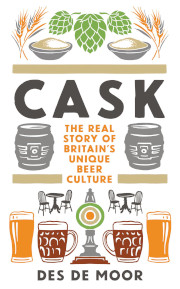 This pioneering new book explains what makes cask beer so special, and explores its past, present and future. Order now from CAMRA Books. Read more here. This pioneering new book explains what makes cask beer so special, and explores its past, present and future. Order now from CAMRA Books. Read more here.
London’s Best Beer 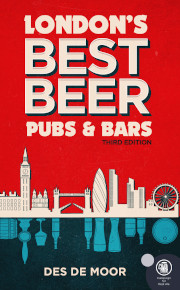 The fully updated 3rd edition of my essential award-winning guide to London’s vibrant beer scene is available now from CAMRA Books. Read more here. The fully updated 3rd edition of my essential award-winning guide to London’s vibrant beer scene is available now from CAMRA Books. Read more here.
|

















